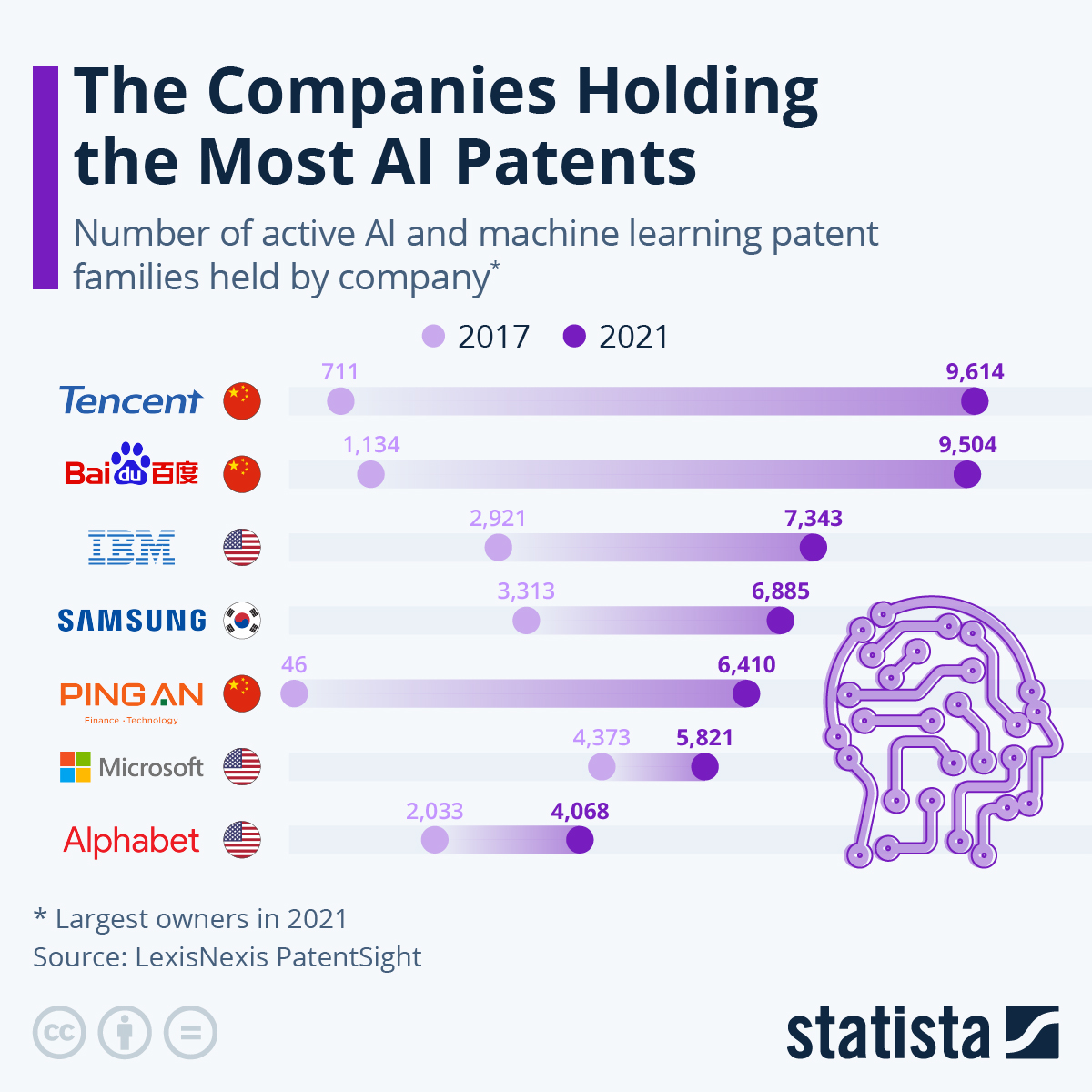
Artificial intelligence technology has experienced booms and busts over the past 60+ years, but it’s currently entering an unprecedented era of rapid advancement. With AI now revolutionizing fields from transportation to healthcare, many established tech giants and research organizations are aggressively patenting AI innovations.
According to data from the World Intellectual Property Organization (WIPO), patent filings for AI-related inventions have grown at an average rate of 28% per year from 2013-2016. This explosion in AI innovation is being led primarily by major companies.
Of the top 500 applicants for AI patents, 333 are companies. Furthermore, 109 of those 333 companies are based in the United States. This includes leading firms like IBM, Microsoft, Intel, Google, and Apple. The top company for AI patents is IBM, which has established itself as a pioneer in AI research and development.
IBM led the industry in the number of artificial intelligence (AI) related patents granted.
Here are some recent examples of companies patenting AI innovations:
- Cognitive Code
- Tesla
- ChatGPT
- Oral-B AI toothbrush
Cognitive Code has patented conversational AI technology that can interact with users via text and speech. Their system aims to simulate human-like conversation better than previous “pseudo-AI” chatbots. The patent protects their approach to building realistic dialog agents.
Tesla has patented various aspects of the machine learning algorithms that power its self-driving vehicles. One 2021 patent covers a technique for improving the AI’s ability to interpret sensory input and decide on actions. Tesla argues this patent is needed to protect its autonomous driving intellectual property as the technology depends heavily on proprietary machine learning.
ChatGPT sparked controversy recently over the potential for its conversational AI to be misused for unethical purposes like cheating on schoolwork. Its launch revived debates about setting ethical boundaries on what tasks we enable AI systems to perform. This shows the tricky terrain of moral implications with advancing AI capabilities.
Even consumer products now utilize basic AI, like the Oral-B AI toothbrush which gives personalized brushing feedback via sensors and a mobile app. While not as ethically fraught, it demonstrates AI integration into common household items. Companies patent even small AI innovations as intellectual property protection for their investments in the technology.
Computer vision, natural language processing and speech recognition also make up major areas. The top fields for AI patent applicants are telecommunications, transportation and healthcare. While tech giants like IBM and Microsoft lead in overall patents related to AI, some dark horse companies are catching up fast with strategic plays.
Beyond the private sector, China has emerged as a hub for academic AI research. Of the 167 universities and public research organizations among the top 500 AI patent applicants, 110 are located in China. The leader within this group is the Chinese Academy of Sciences.
Geographically, most AI patent applications are filed with patent offices in the United States and China. The United States accounts for 152,981 total filings, while China has 137,010. Both countries have vibrant technology sectors driving AI innovation as well as large markets ready to consume AI products and services.
The Companies With the Most AI Patents
According to patent database LexisNexis, Chinese firms Tencent and Baidu now hold the most active patent families pertaining to AI and machine learning. Each owned over 9,000 active AI patent families in 2021, surpassing former leaders like IBM and Microsoft.
Driving this patent rush is Chinese insurance provider Ping An, who stunningly grew their AI patent portfolio from under 50 to over 6,000 families in just the last five years. They are developing AI tools for use cases like analyzing facial expressions in video claims to assist with approvals.
Microsoft previously ranked first in AI patents between 2012-2019. But with under 6,000 patent families in 2021, they’ve slipped in the rankings. Still, Microsoft continues major investments in AI, including a rumored $10 billion further funding round for conversational AI startup OpenAI on the heels of their wildly popular ChatGPT bot.
 You will find more infographics at Statista
You will find more infographics at StatistaThe rapid growth and patenting activity related to AI reflects the technology’s increasing integration into fields like transportation, telecommunications, medicine, agriculture, and more. Key innovations include machine learning techniques like deep learning and neural networks as well as AI applications like computer vision, natural language processing, and speech recognition.
As AI spreads into new sectors in the coming years, continued intellectual property leadership will likely require companies to sustain heavy investments in research and strategic acquisitions. For example, Alphabet alone has acquired 18 AI companies, the most of any top 20 patent holder. Sustaining the pipeline of ideas and talent will be critical for companies looking to remain at the forefront of AI innovation.






